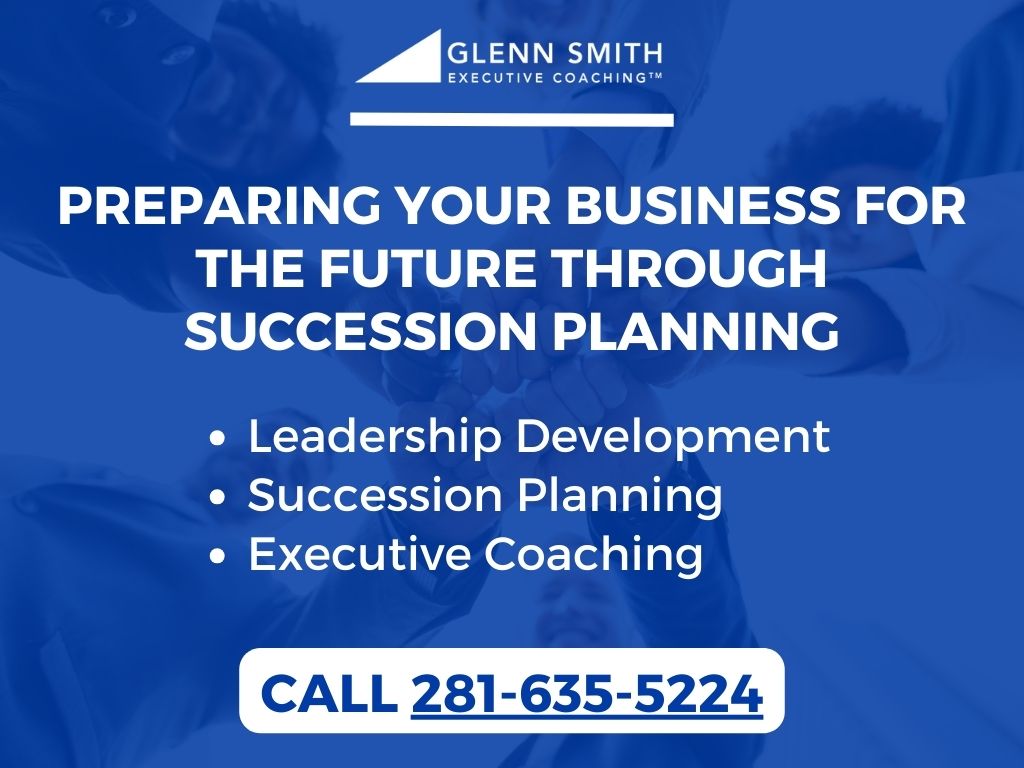Sugar Land, TX – Succession planning is critical to ensuring a business’s long-term viability and success. It involves identifying and developing future leaders who can seamlessly transition into key roles when current leaders retire or move on. This proactive approach safeguards the continuity of operations, nurtures talent, fosters growth, and maintains stability within the company.

Developing Leaders
Succession planning begins with cultivating leadership talent within an organization. Inspired by military strategies, three essential elements are recommended: documented Standard Operating Procedures (SOPs), a turnover checklist, and mentoring programs. By documenting critical procedures and processes, creating turnover checklists, and providing mentorship opportunities, knowledge and expertise can be effectively transferred to future leaders.
Creating a Turnover Checklist to Ensure a Smooth Transition
A turnover checklist is a comprehensive document outlining essential tasks and responsibilities that need to be handled without key personnel. It serves as a roadmap for smooth transitions and minimizes disruptions in operations. In family-owned businesses, where distinct roles among siblings are common, each member can create a turnover checklist detailing their specific duties and procedures.
Each position is inherently distinct in every company, influenced by the organization’s specific personnel, policies, culture, and market dynamics. To seamlessly transition into their new role, a successor must grasp the critical success factors, drivers, and influencers unique to that position. Turnover checklists capitalize on the collective wisdom of former incumbents, facilitating the transfer of essential knowledge to successors and ensuring their full preparation for success in their new roles.
Identifying Future Leaders
Selecting suitable successors is paramount to the success of any succession plan. Envisioning the future of the business and identifying individuals who possess the necessary skills, mindset, and potential to lead is crucial. Organizations can ensure a seamless leadership transition by addressing gaps in leadership and management early on, such as bringing in external expertise or developing internal talent.
Creating a leadership competency framework is essential to define the criteria that will guide the selection and development of future leaders. This framework outlines the knowledge, skills, abilities, and behaviors expected from leaders at different levels and functions, incorporating organizational values, culture, and vision to ensure alignment and fit.
Leadership criteria should be specific, measurable, achievable, relevant, and time-bound, reflecting the organization’s diversity and inclusion goals. Identifying high-potential employees based on these criteria involves utilizing various assessment methods, such as performance reviews, feedback, psychometric tests, interviews, or simulations. Often, potential leaders are found beyond obvious candidates in management positions or with high-performance ratings.
Investing in Successors’ Development
Once potential successors are identified, the grooming process should commence immediately. Developing and preparing them takes about three to five years, offering them opportunities for growth, education, and hands-on experience. Even without technical expertise in the industry, leadership, learning capability, and a desire to take on responsibility can compensate. Providing guidance during the development process is crucial.
Crafting individual development plans to delineate specific goals, actions, and resources required for each employee to reach their potential is essential. Development methods and interventions, such as coaching, mentoring, training, job rotation, project assignments, or cross-functional teams, expose them to diverse challenges and learning experiences. Regular monitoring and evaluation of their progress, along with providing feedback and recognition, further facilitate their growth and development.
Navigating Family Dynamics
Family businesses face unique challenges in planning for leadership succession, intertwining personal relationships, emotions, and business matters. Open communication is key to creating an environment where expectations, concerns, and ambitions can be openly discussed respectfully. Transparency prevents misunderstandings and fosters a shared vision for the business’s future.
Building trust is also vital. Since personal and professional lives are closely intertwined in family businesses, trust is the foundation that holds everything together. Establishing and maintaining trust ensures each family member feels valued and confident in their role and contributions to the family’s legacy.
When complexities surpass in-house problem-solving processes, seeking external advice becomes essential. Experts specializing in family-run business succession can provide unbiased opinions, arbitrate conflicts, and propose strategies that honor both family-based and corporate sides of the entity.
Ensuring Smooth Transitions
Successful leadership transition requires meticulous planning, ongoing communication, and professional guidance. With the help of experienced coaches like Glenn Smith, businesses can navigate complexities, resolve conflicts, and ensure a seamless power transfer. From strategic planning to training and development, Glenn Smith provides the tools and support to execute effective succession plans.
Succession planning is not just about preparing for the future; it’s about building a resilient and sustainable organization capable of thriving in an ever-changing landscape. By investing in leadership development, identifying and grooming successors, and addressing emotional and relationship aspects, businesses can ensure a smooth transition of power and position themselves for long-term success. With the guidance of Glenn Smith Executive Coaching, organizations can navigate the intricacies of succession planning with confidence and clarity.
About Glenn Smith Executive Coaching:
Glenn Smith Executive Coaching is a premier leadership development and business coaching firm dedicated to helping businesses achieve their full potential. Founded by Glenn Smith, a seasoned executive coach with over 25 years of experience, the firm specializes in guiding organizations through complex transitions and growth phases. Offering services such as executive coaching, leadership development, succession planning, team development, and strategic planning, Glenn Smith Executive Coaching adopts a holistic approach tailored to meet the unique needs of each client. The firm’s mission is to empower leaders, foster growth, and drive organizational success through practical strategies, actionable insights, and measurable results.
glenn@glennsmithcoaching.com
Media Contact

Name
Glenn Smith Executive Coaching
Contact name
Glenn Smith
Contact phone
281-635-5224
Contact address
4655 Sweetwater Blvd, Suite 375
City
Sugar Land
State
Texas
Zip
77479
Country
US
Url
https://glennsmithcoaching.com/






